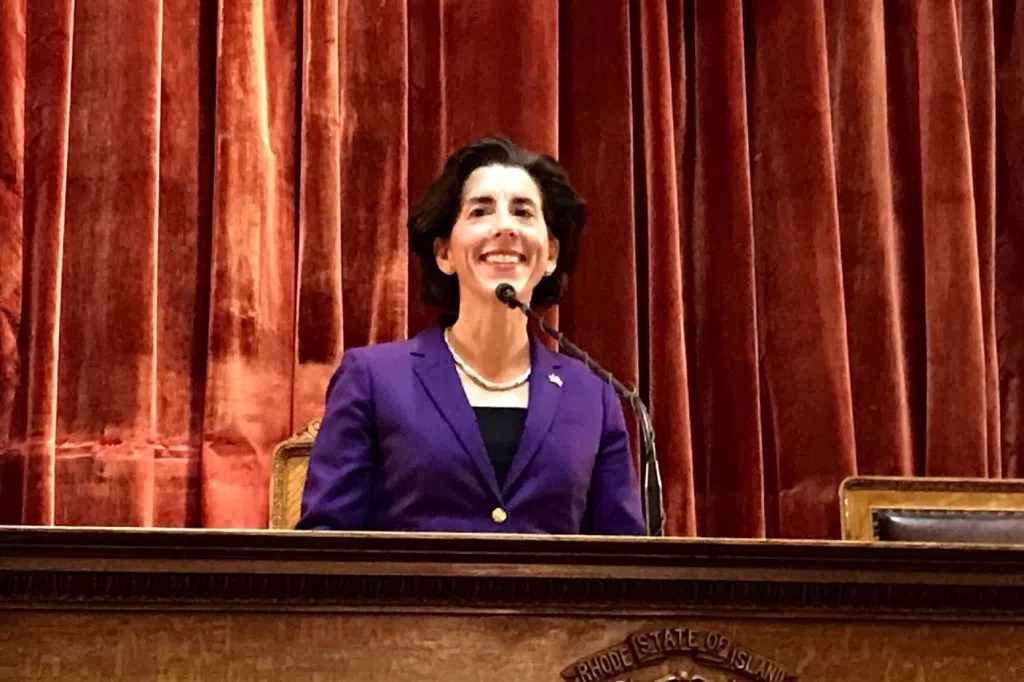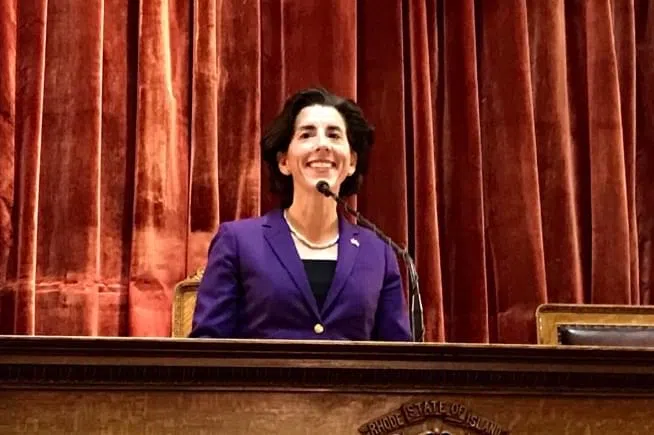
By Tessa Roy, WPRO News
In her first State of the State address of her second term, Governor Gina Raimondo spent time discussing what she saw as Rhode Island’s successes – more jobs, better roads and bridges – but cited ongoing struggles in public education. She called for the state to do “whatever it takes to make Rhode Island’s schools competitive with our neighbors and give every single one of our children a shot at a bright future — no matter their background or their zip code.”
“In Rhode Island, we’ve had a pattern of not sticking with an approach long enough to generate results,” she said. “For years, we’ve bounced from test to test, until finally last year embracing what Massachusetts has consistently used for years.”
Raimondo said her proposed budget dedicates an extra $30 million for schools, plus some funds that would begin an effort to implement universal Pre-K.
“By the time I leave office, there will be a Pre-K seat for every four-year-old whose parents want it,” she pledged.
Also on her education front was a proposed expansion of Rhode Island Promise, her free tuition program that’s currently only available at CCRI. Raimondo wants to make the last two years of a four year Rhode Island College degree tuition-free, and further extend the program to the University of Rhode Island by the time she finishes her second term.
“This small but smart investment — a few million dollars in a $10 billion budget — will change lives, strengthen our economy and help us fulfill our obligation to ensure that every Rhode Islander can get a good job,” she said, claiming cost is a prohibitive factor for many students who don’t end up finishing their degrees.
Raimondo laid out other priorities, including increasing the minimum wage to $11.10/hour to get on a path towards $15/hour, expanding mental health care, codifying Roe vs. Wade, gun control, and job training.
House Speaker Nick Mattiello said he liked the idea of expanding Rhode Island Promise as well as Raimondo’s other proposals, but was skeptical about whether the state could afford them.
“I don’t know if any of you were doing math while the governor was compiling her agenda proposals, and I liked every one of them, but the money’s coming from somewhere, so you’ve got to assess where the pain is before you can look to go forward,” he told reporters after the speech.
Senate President Dominick Ruggerio spoke similarly.
“I think we’re going to look at the data that we have and see if it’s worthwhile to go forward. Obviously she has an efficient agenda, a lot of money. We’re going to have to take a look at it when the budget comes out,” he said.
In the Republican response, House Minority Leader Blake Filippi seemed to agree with the governor that education must be a priority.
“Our state will never achieve its potential if we fail to fix our broken education system. Many of our public elementary and secondary schools are failing our children – the recent statewide assessment tests are a shocking wake up call,” he said. “We have a two-tiered education system: if you have the means to send your kid to private school, they will most likely get a good education, and if you can’t, you roll the dice with your children’s future.”
He said local control over schools that’s been “usurped” by State House bureaucrats and a “dysfunctional” Washington must be restored, but said “dispersed responsibility inhibits accountability.”
Filippi differed from the governor on business, saying the state’s business climate is hostile. He pointed to Jason Fane, the New York developer whose proposed Hope Point Tower was met with opposition from Providence residents and a zoning change veto from Mayor Jorge Elorza.
“Mr. Fane has not been treated fairly by the city of Providence, and his character has been attacked by some. This treatment of those who wish to invest in our state cannot go on,” he said. “Instead, we say ‘Thank you Mr. Fane. And we are sorry for the way you have been treated.’”
Filippi also had complaints about state spending, which he said is too high. He called for enacting a line item veto and creating an Inspector General’s office to bring it under control.
“Government must begin to budget like our families do – at our kitchen tables all over this state.”







